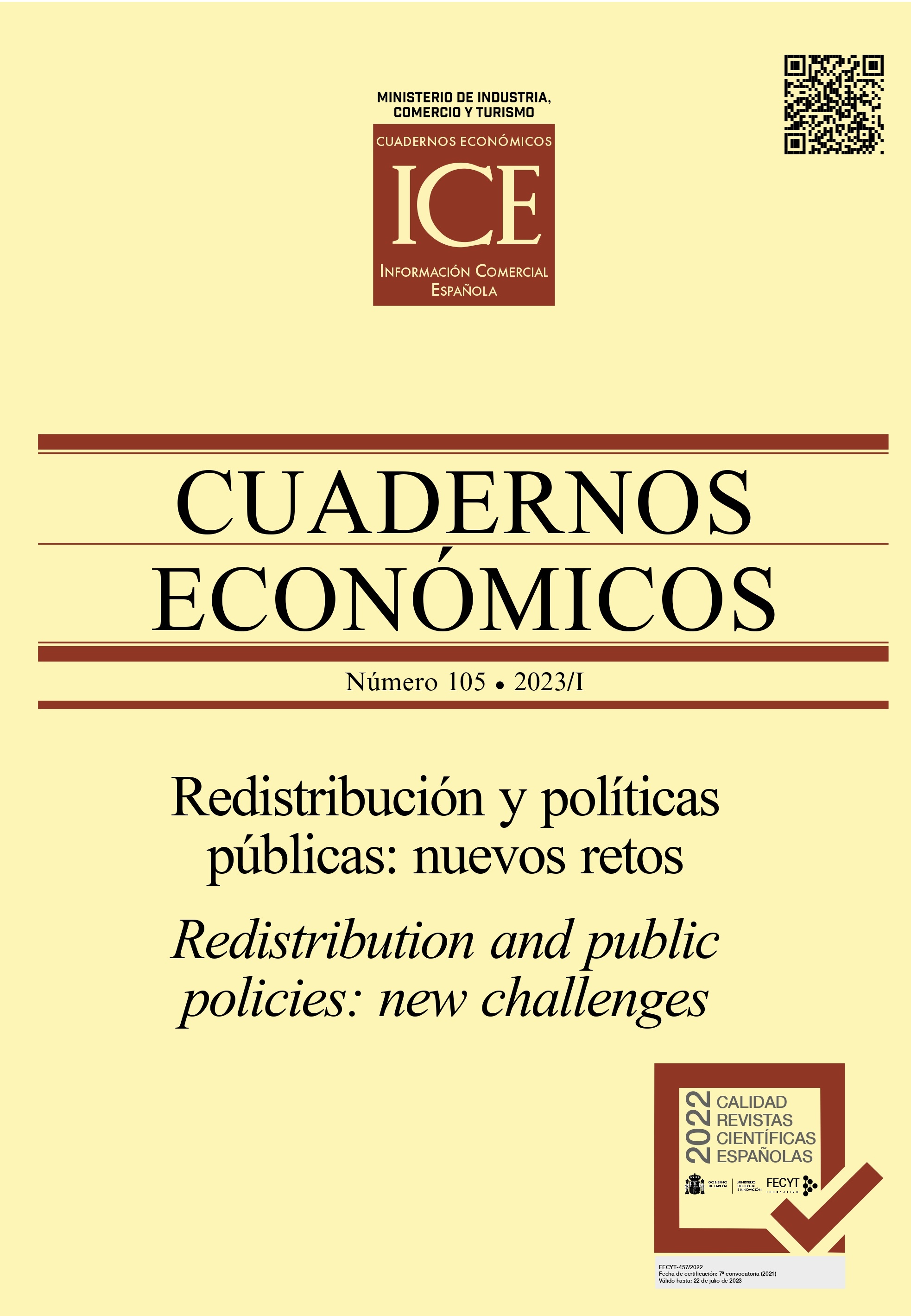Tax redistribution models in the European Union: Where does Spain stand?
##plugins.themes.bootstrap3.article.sidebar##
Downloads
##plugins.themes.bootstrap3.article.main##
The purpose of this paper is to identify the problems that explain the limited capacity of the Spanish tax system to correct income inequality, with special attention to elements such as revenue sufficiency, progressivity, the weight of direct and indirect taxation, and the tax design of the main figures levied on households. The analysis is based on the identification of tax redistribution models within the EU-28, both for the system as a whole and for the main components of the tax mix. Special attention is paid to the unequal role played by indirect taxation, which is not usually considered in comparative analyses. It concludes that Spain's position in relation to other European Union countries in terms of fiscal redistribution seems to be explained, above all, by the smaller size of its direct taxation. Finally, the paper offers some reflections on possible reforms to strengthen the redistributive capacity of the tax system and its contribution of resources to the financing of public spending.
##plugins.themes.bootstrap3.article.details##
- Julio López Laborda, Jorge Onrubia, Presentación , Cuadernos Económicos de ICE: No. 105 (2023): Redistribución y políticas públicas: nuevos retos
AIReF, Autoridad Independiente de Responsabilidad Fiscal. (2022). Informe sobre la actualización del Programa de Estabilidad 2022-2025. Informe 21/22. Madrid: AIReF. https://www.airef.es/wp-content/uploads/2022/WEB/APÈ/Infome-APE-2022-2025_20220704.pdf
Banco de España. (2021). Informe Anual 2020. Banco de España, Madrid. https://www.bde.es/f/webbde/SES/Secciones/Publicaciones/PublicacionesAnuales/InformesAnuales/20/Fich/InfAnual_2020.pdf
Blasco, J., Guillaud, E., & Zemmour, M. (2020). Consumption Taxes and Income Inequality. An International Perspective with Microsimulation. LIS working papers series, 785, February 2020. https://hal.archives-ouvertes.fr/hal-02735145
Blasco, J., Guillaud, E. & Zemmour, M. (2021). La TVA réduit-elle l’efficacité des systèmes socio-fiscaux de redistribution?. LIEPP Policy Brief, 51, Mars 2021. https://spire.sciencespo.fr/hdl:/2441/5hki464i4m83kbaesvk0bflt2l/resources/liepp-pb-51-blasco-guillaud-zemmour.pdf
Causa, O., & Hermansen, M. (2017). Income redistribution through taxes and transfers across OECD countries. OECD Economics Department Working Papers, 1453. https://doi.org/10.1787/bc7569c6-en.
Comisión Europea. (2021). European Economic Forecast. Spring 2021. European Economy Institutional Papers, 149, May 2021. European Commission's Directorate-General for Economic and Financial Affairs, Bruselas. https://ec.europa.eu/info/sites/default/files/economy-finance/ip149_en.pdf
Comité de Personas Expertas para elaborar el Libro Blanco sobre la reforma tributaria. (2022). Libro Blanco sobre la reforma tributaria. Instituto de Estudios Fiscales. Ministerio de Hacienda. https://www.ief.es/docs/investigacion/comiteexpertos/LibroBlancoReformaTributaria_2022.pdf
Decoster, A., Loughrey, J., O'Donoghue, C., & Verwerft, D. (2010). How regressive are indirect taxes? A microsimulation analysis for five European countries. Journal of Policy Analysis and Management, 29(2), 326-350.
Georges-Kot, S. (2015). Annual and lifetime incidence of the value-added tax in France. Document de Travail, Nº G 2015/12. Direction des Études et Synthèses Économiques, Institut National de la Statistique et des Ètudes Économiques. https://www.insee.fr/fr/statistiques/1381136
Gobierno de España. (2022). Actualización del Programa de Estabilidad 2022-2025. https://www.hacienda.gob.es/CDI/Programas%20de%20Estabilidad/Programa-de-Estabilidad-2022-2025.pdf
Goerlich, F. J. (2016). Distribución de la renta, crisis económica y políticas redistributivas. Fundación BBVA, Bilbao.
Kakwani, N. C. (1977). Measurement of Tax Progressivity: An International Comparison. Economic Journal, 87(345), 71-80.
Levell, P., Roantree, B., & Shaw, J. (2015). Redistribution from a Lifetime Perspective. IFS Working Paper, W 15/27. Institute for Fiscal Studies.http://www.ifs.org.uk/uploads/publications/wps/WP201527.pdf
López-Laborda, J., Marín-González, C. & Onrubia, J. (2016). Estimación de los impuestos pagados por los hogares españoles en 2013 a partir de la Encuesta de Presupuestos Familiares y la Encuesta de Condiciones de Vida. Metodología. Estudios sobre la Economía Española, 2016/20, FEDEA. https://documentos.fedea.net/pubs/eee/eee2016-20.pdf
López-Laborda, J., Marín-González, C., & Onrubia, J. (2018). Tipo reducido, superreducido y exenciones en el IVA: una estimación de sus efectos recaudatorios y distributivos a partir de las encuestas de hogares. Estudios de Economía Española, FEDEA. https://documentos.fedea.net/pubs/eee/eee2018-23.pdf
López-Laborda, J., Marín-González, C., & Onrubia, J. (2021a). Estimating Engel curves: a new way to improve the SILC-HBS matching process using GLM methods. Journal of Applied Statistics, 48(16), 3233-3250.
López-Laborda, J., Marín-González, C., & Onrubia, J. (2021b). Observatorio sobre el reparto de los impuestos y las prestaciones entre los hogares españoles. Sexto informe – 2017 y 2018. FEDEA. https://documentos.fedea.net/pubs/eee/eee2021-33.pdf
López-Laborda, J., Marín-González, C., & Onrubia, J. (2022). The removal of tax expenditures from Spanish personal income tax: Impact on tax collection and income distribution. Public Budgeting & Finance, 42(2), 221-254. https://doi.org/10.1111/pbaf.12312.
Meltzer, A. H., & Richard, S. F. (1981). A Rational Theory of the Size of Government. Journal of Political Economy, 89(5), 914-927.
Saez, E., Slemrod, J., & Giertz, S. H. (2012). The Elasticity of Taxable Income with Respect to Marginal Tax Rates: A Critical Review. Journal of Economic Literature, 50(1), 3-50.
Saez, E., & Zucman, G. (2019). Clarifying distributional tax incidence: Who pays current taxes vs. tax reform analysis. Working Paper, UC Berkeley. October 2019. http://gabriel-zucman.eu/files/SaezZucman2019Incidence.pdf
Thomas, A. (2020). Reassessing the regressivity of the VAT. OECD Taxation Working Papers, 49. https://doi.org/10.1787/b76ced82-en


